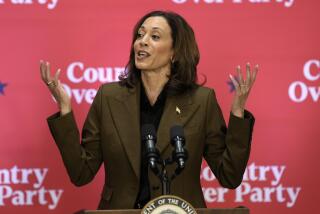Gore Sits Down With Working Women
- Share via
WATERLOO, Iowa — There was Deb Dyer, a rehabilitation and medical aide who, after working half her life at a nursing home, still only makes $9.15 an hour.
And there was Linda Martin, who donated a kidney to her brother because “I could not imagine not having him across the table at Thanksgiving dinner.” She wanted to know what could be done to extend government support for workers taking time off to care for relatives.
For an hour Friday, with Vice President Al Gore serving as both questioner and answer man, Dyer, Martin and several other women described the challenges faced by working women.
In exchange, Gore offered sympathy, occasional government solutions and, to one woman, a consoling cup of coffee.
It was a campaign appearance absent the verbal accouterments of a campaign: Candidate Gore never mentioned, never even referred to in passing, Bill Bradley, his rival for the Democratic presidential nomination. And he only obliquely noted Texas Gov. George W. Bush, a candidate for the Republican presidential nomination, when he recalled that the recession of the early 1980s occurred when “Ronald Reagan was elected--Ronald Reagan and George Bush, as I recall.”
Nevertheless, Gore’s participation in a conference, “Ask a Working Woman,” sponsored by the AFL-CIO to address such issues as child care and inadequate pay, went to the heart of one of his political challenges: overcoming any reservations among women, whose votes were crucial to Bill Clinton’s 1992 victory over the elder Bush.
As one participant after another brought out the difficulties they face--a former police officer who took a $17,000 pay cut when she quit the force to teach eighth-grade English and reading, a nurse struggling to pay $90 a week for child care--Gore offered a running commentary while avoiding the jargon-infested, acronym-weighted details that once bogged down his speeches.
Indeed, he spent more time listening than speaking, and when he did speak up, it was more often than not to ask a question.
But when Dyer, 43, told of the problems her 68-year-old mother has paying for prescription drugs, he said: “We need a lot more competition for the big pharmaceutical companies. They’ve monopolized pricing practices to a much greater extent than is justified.”
After Martin spoke about the problems she and her family faced in caring for her brother, Gore said the family medical leave program should be extended to allow parents time from work to take children to medical appointments or to attend conferences with teachers.
“Those are the kinds of obligations that ought to be honored,” he said.
Martin added that the unpaid time off is insufficient for some families; although employers allow workers the time, many cannot afford to go without the pay for the work they miss.
Melinda Pencook, a single mother and nurse raising a 4-year-old, had worked an overnight shift until 7:30 a.m. before coming to the late-morning meeting. Paying for child care, she said, is like making a second house payment every month.
To her, Gore said that child care is “obviously . . . one of the biggest challenges working parents face.” Without saying how he would pay for it, Gore said he strongly favors increasing the availability of “high-quality, affordable child care.”
And he offered her a Styrofoam cup of coffee brought into the meeting room by an aide.
Recent polling suggests greater fluctuation in women’s presidential preferences than among men. According to autumn polls by the Pew Research Center for the People and the Press, Gore is increasing in strength in a match-up against Bush, with most of the new support coming from women.
Among female voters, Bush led Gore by 13 percentage points in a September poll. A month later, Gore outpaced Bush by 5 percentage points.
But, said Andrew Kohut, the research center’s director, among women there remains “a hangover from the [Monica S. Lewinsky] scandal--the so-called Clinton fatigue,” that Gore needs to overcome. Still, those concerns notwithstanding, Gore is running ahead of Bradley among female voters.
Kohut said Gore, over the long run, needs to “make the kind of connection that Clinton made with women four and eight years ago. They had a sense Clinton understood their problems. Gore has to give these women a sense of his leadership ability.”
More to Read
Get the L.A. Times Politics newsletter
Deeply reported insights into legislation, politics and policy from Sacramento, Washington and beyond. In your inbox twice per week.
You may occasionally receive promotional content from the Los Angeles Times.










